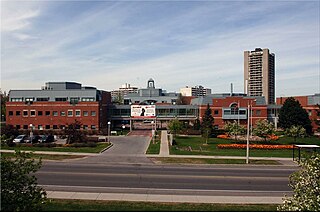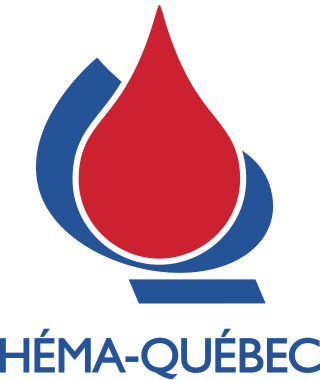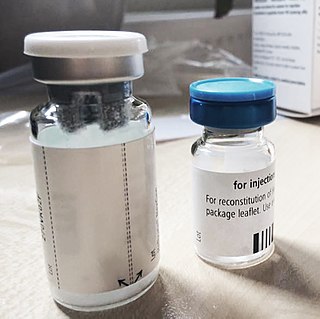
Blood plasma is a light amber-colored liquid component of blood in which blood cells are absent, but which contains proteins and other constituents of whole blood in suspension. It makes up about 55% of the body's total blood volume. It is the intravascular part of extracellular fluid. It is mostly water, and contains important dissolved proteins, glucose, clotting factors, electrolytes, hormones, carbon dioxide, and oxygen. It plays a vital role in an intravascular osmotic effect that keeps electrolyte concentration balanced and protects the body from infection and other blood-related disorders.

A blood donation occurs when a person voluntarily has blood drawn and used for transfusions and/or made into biopharmaceutical medications by a process called fractionation. Donation may be of whole blood, or of specific components directly (apheresis). Blood banks often participate in the collection process as well as the procedures that follow it.

Apheresis is a medical technology in which the blood of a person is passed through an apparatus that separates out one particular constituent and returns the remainder to the circulation. It is thus an extracorporeal therapy.

Plasmapheresis is the removal, treatment, and return or exchange of blood plasma or components thereof from and to the blood circulation. It is thus an extracorporeal therapy, a medical procedure performed outside the body.

The Centre for Addiction and Mental Health is a psychiatric teaching hospital located in Toronto and ten community locations throughout the province of Ontario, Canada. It reports being the largest research facility in Canada for mental health and addictions. The hospital was formed in 1998 from the amalgamation of four separate institutions – the Queen Street Mental Health Centre, the Clarke Institute of Psychiatry, the Addiction Research Foundation, and the Donwood Institute. It is Canada's largest mental health teaching hospital, and the only stand-alone psychiatric emergency department in Ontario. CAMH has 90 distinct clinical services across inpatient, outpatient, day treatment, and partial hospitalization models. CAMH has been the site of major advancements in psychiatric research, including the discovery of the Dopamine receptor D2.

Plateletpheresis is the process of collecting thrombocytes, more commonly called platelets, a component of blood involved in blood clotting. The term specifically refers to the method of collecting the platelets, which is performed by a device used in blood donation that separates the platelets and returns other portions of the blood to the donor. Platelet transfusion can be a life-saving procedure in preventing or treating serious complications from bleeding and hemorrhage in patients who have disorders manifesting as thrombocytopenia or platelet dysfunction. This process may also be used therapeutically to treat disorders resulting in extraordinarily high platelet counts such as essential thrombocytosis.

Canadian Blood Services is a non-profit charitable organization that is independent from the Canadian government. The Canadian Blood Services was established as Canada's blood authority in all provinces and territories except for Quebec in 1998. The federal, provincial and territorial governments created the Canadian Blood Services through a memorandum of understanding. Canadian Blood Services is funded mainly through the provincial and territorial governments.

The tainted blood disaster, or the tainted blood scandal, was a Canadian public health crisis in the 1980s in which thousands of people were exposed to HIV and hepatitis C through contaminated blood products. It became apparent that inadequately-screened blood, often coming from high-risk populations, was entering the system through blood transfusions. It is now considered to be the largest single (preventable) public health disaster in the history of Canada.

Fresh frozen plasma (FFP) is a blood product made from the liquid portion of whole blood. It is used to treat conditions in which there are low blood clotting factors or low levels of other blood proteins. It may also be used as the replacement fluid in plasma exchange. Using ABO compatible plasma, while not required, may be recommended. Use as a volume expander is not recommended. It is administered by slow injection into a vein.
Rho(D) immune globulin (RhIG) is a medication used to prevent RhD isoimmunization in mothers who are RhD negative and to treat idiopathic thrombocytopenic purpura (ITP) in people who are Rh positive. It is often given both during and following pregnancy. It may also be used when RhD-negative people are given RhD-positive blood. It is given by injection into muscle or a vein. A single dose lasts 12 weeks. It is made from human blood plasma.
The Irish Blood Transfusion Service (IBTS), or Seirbhís Fuilaistriúcháin na hÉireann in Irish, was established in Ireland as the Blood Transfusion Service Board (BTSB) by the Blood Transfusion Service Board (Establishment) Order, 1965. It took its current name in April 2000 by Statutory Instrument issued by the Minister for Health and Children to whom it is responsible. The Service provides blood and blood products for humans.

Héma-Québec is a non-profit organization that supplies blood and other biological products of human origin to hospitals for the Canadian province of Quebec. The organization's headquarters is located in the Montreal borough of Saint-Laurent, Quebec, and it was created on March 26, 1998, as a successor to the Canadian Red Cross Blood Program and the Canadian Blood Agency on recommendation of the Krever Commission.
NHS Blood and Transplant is an executive special health authority of the United Kingdom's Department of Health and Social Care. It was established on 1 October 2005 to take over the responsibilities of two separate NHS agencies: UK Transplant, founded by Dr. Geoffrey Tovey in 1972, and the National Blood Service. Its remit is to provide a reliable, efficient supply of blood, organs and associated services to the NHS. Since NHSBT was established, the organisation has maintained or improved the quality of the services delivered to patients, stabilised the rising cost of blood, and centralised a number of corporate services.
Contaminated hemophilia blood products were a serious public health problem in the late 1970s up to 1985.
William Gary Whatcott, known as Bill Whatcott, is a Canadian social conservative activist who campaigns against homosexuality and abortion. The dramatic nature of his activities have attracted attention from the media, including an appearance on The Daily Show. He has also run for political office in Toronto, Saskatchewan and Edmonton.

World Blood Donor Day (WBDD) is held on June 14 each year. The event was organised for the first time in 2004, by four core international organizations: the World Health Organization, the International Federation of Red Cross and Red Crescent Societies; the International Federation of Blood Donor Organizations (IFBDO) and the International Society of Blood Transfusion (ISBT) to raise awareness of the need for safe blood and blood products, and to thank blood donors for their voluntary, life-saving gifts of blood. World Blood Donor Day is one of 11 official global public health campaigns marked by the World Health Organization (WHO), along with World Health Day, World Chagas Disease Day, World Tuberculosis Day, World Immunization Week, World Patient Safety Day, World Malaria Day, World No Tobacco Day, World Hepatitis Day, World Antimicrobial Awareness Week and World AIDS Day.

From the 1970s to the early 1990s, tens of thousands of people were infected with hepatitis C and HIV as a result of receiving infected blood or infected clotting factor products in the United Kingdom. Many of the products were imported from the United States, and distributed to patients by the National Health Service. Most recipients had haemophilia or had received a blood transfusion following childbirth or surgery. It has been estimated that more than 30,000 patients received contaminated blood, resulting in the deaths of at least 3,000 people. In July 2017, Prime Minister Theresa May announced an independent public inquiry into the scandal, for which she was widely praised as successive governments going back to the 1980s had refused such an inquiry. May stated that "the victims and their families who have suffered so much pain and hardship deserve answers as to how this could possibly have happened." The final report was published in seven volumes on 20 May 2024, concluding that the scandal could have been largely avoided, patients were knowingly exposed to "unacceptable risks", and that doctors, the government and NHS tried to cover up what happened by "hiding the truth".
Immunoglobulin therapy is the use of a mixture of antibodies to treat several health conditions. These conditions include primary immunodeficiency, immune thrombocytopenic purpura, chronic inflammatory demyelinating polyneuropathy, Kawasaki disease, certain cases of HIV/AIDS and measles, Guillain–Barré syndrome, and certain other infections when a more specific immunoglobulin is not available. Depending on the formulation it can be given by injection into muscle, a vein, or under the skin. The effects last a few weeks.
The Trillium Gift of Life Network was an agency of the Government of Ontario responsible for the province's organ donation strategy, promotion, and supply. Ronnie Gavsie was the President & CEO. The agency maintained the popular BeADonor.ca website. It was subsequently subsumed under Ontario Health in 2019.

CSL Plasma is a plasmapheresis company which claims to be one of the largest companies of its kind in the world. It is a subsidiary of CSL Limited, a biotechnology company based in Melbourne, Australia, but has their own headquarters in Boca Raton, Florida. The company employs around 17,000 staff and has over 300 locations in multiple countries. Collected plasma, encouraged through company-sponsored programs such as "Plasma P.A.L.S.", is used for testing or manufacturing plasma-derived therapies and medicine. The company was a finalist in the 2021 and 2022 South Florida Business Journal "Business of the Year Awards". In 2023, the company was made to make settlements in two discrimination lawsuits.













